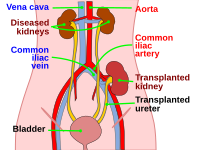
Photo from wikipedia
The assessment of the vitamin K status and its effects on clinical outcomes in kidney transplantation (KT) patients has sparked interest, but it is still largely unfulfilled. In part, this… Click to show full abstract
The assessment of the vitamin K status and its effects on clinical outcomes in kidney transplantation (KT) patients has sparked interest, but it is still largely unfulfilled. In part, this is due to difficulties in laboratory measurements of vitamin K, especially K2 vitamers. Vitamin K status is currently best assessed by measuring undercarboxylated vitamin-K-dependent proteins. The relative contribution of vitamin K1 and K2 to the health status of the general population and CKD (chronic kidney disease) patients, including KT patients, is also poorly studied. Through a complete and first review of the existing literature, we summarize the current knowledge of vitamin K pathophysiology and its potential role in preventing KT complications and improving organ survival. A specific focus is placed on cardiovascular complications, bone fractures, and the relationship between vitamin K and cancer. Vitamin K deficiency could determine adverse outcomes, and KT patients should be better studied for vitamin K assessment and modalities of effective therapeutic approaches.
Journal Title: Nutrients
Year Published: 2020
Link to full text (if available)
Share on Social Media: Sign Up to like & get
recommendations!